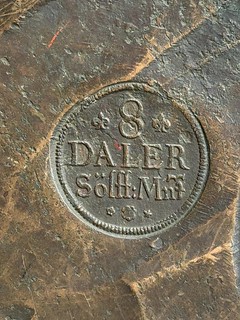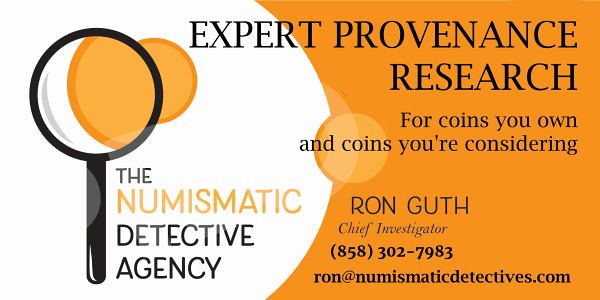
PREV ARTICLE
NEXT ARTICLE
FULL ISSUE
PREV FULL ISSUE
1659 SWEDISH 8 DALER PLATE MONEYStack's Bowers Galleries published this article on a large, rare example of Swedish copper plate money. -Editor Not all change can be carried in one's wallet or even in a pocket; some money can't even be carried in a regular backpack. One such item is lot 12197 in our sale of the L. E. Bruun Collection Part III, coming up at the end of this month. Sweden had been geologically blessed with great copper fields, the largest being in the Great Copper Mountain of Falun, where a mining operation had been ongoing since the 10th century. But a large-scale production of copper coins from its mines didn't happen before the warmongering Gustaf II Adolph needed more money for his wars and large building projects of the early-17th century. As silver and gold were considered real money, the copper coins had to weigh the equivalent to the silver weight of the denomination (known as full-bodied coins). By the mid-17th century Swedish copper mines supplied upwards of two-thirds of the copper used in Europe. Heavily reliant on revenue from these sales to finance its many wars, the idea was presented to the Swedish Privy Council to use some of the copper to mint large denomination coins for their reserve and to keep a portion of the copper off the international market, thus increasing the market price. In 1644, toward the end of the 30-Year War, they created the 8 and 10 Daler pieces, based on the large copper plates they had been producing for export to Hungary since the 1540s. The striking of copper began at the Avesta mint, located not far from the mines of Falun. The production was simple and cheap: the copper was heated only once, hammered to an even thickness and then cut in squares to the appropriate weight. Five stamps were then struck on the plate – one in each corner with the date and royal cipher of the ruler, and with the center stamp bearing the denomination. The "king" of plate money, the 10 Daler of almost 20 kilos, is nearly impossible to come by, with only one known in private hands today. But our Bruun Part III auction offers a chance to own its famous "queen," the 8 Daler, an extremely rare denomination, with only four recorded in public sales over the last 20 years. This 8 Daler was struck in 1659, during the reign of Karl X Gustav – and at the height of the Dano-Swedish War, around the time when Swedish troops had surrounded Copenhagen. It is currently the largest circulating coin offered for private ownership with a length of 62.5 cm and a hefty weight of 14.53 kilos. Due to their large size, they were often placed in storage as a reserve of wealth and very rarely used in commerce. It's an excellent, even example without corrosion, offering agreeable color and all five stamps clearly struck. Plate money production ceased in 1776 – these latest ones antedated 1768 and were produced exclusively for export purposes. In fact most of the plate money that has survived to this day comes from outside of Sweden, mainly from shipwrecks. Demonetized Plate money was popular as ballast which would be traded for colonial goods. The two best known finds of plate money are the Nicobar, which was wrecked in 1783 in False Bay, South Africa, and the Schimmelmann, which ran aground at Cape Verde in 1781. We encourage readers to take the opportunity to view lot 12197 and bid on this piece of numismatic history when it crosses the block in Session 2 of our L. E. Bruun Collection Part III Auction, October 30, 2025 in Copenhagen.
To read the complete article, see:
To read the complete lot description, see:
Wayne Homren, Editor The Numismatic Bibliomania Society is a non-profit organization promoting numismatic literature. See our web site at coinbooks.org. To submit items for publication in The E-Sylum, write to the Editor at this address: whomren@gmail.com To subscribe go to: Subscribe All Rights Reserved. NBS Home Page Contact the NBS webmaster 
|



